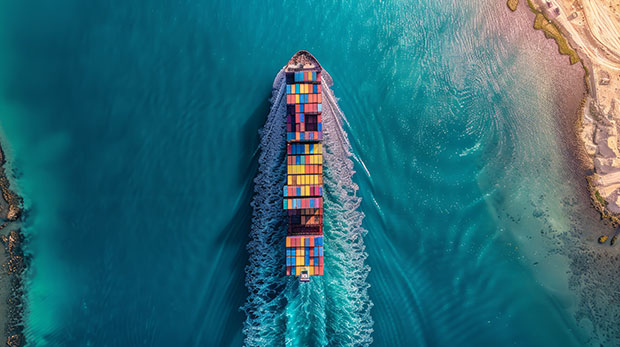Navigating international trade presents multifaceted challenges influenced by geopolitical shifts, currency fluctuations, and logistical complexities. To optimise operations, businesses must strategically select from various shipping modes (air, sea, rail, road) considering factors like speed, cost, and regulatory compliance. Here are essential considerations for successful global trade.
 Regulatory Compliance: Adhere to international trade regulations, tariffs, and sanctions to prevent delays and penalties. Stay informed about evolving regulations like Incoterms, customs duties, and import/export restrictions.
Regulatory Compliance: Adhere to international trade regulations, tariffs, and sanctions to prevent delays and penalties. Stay informed about evolving regulations like Incoterms, customs duties, and import/export restrictions.
Technology Integration: Embrace digital solutions such as blockchain, IoT, and AI to streamline processes, enhance visibility, and improve efficiency in logistics and inventory management.
Risk Management: Develop robust strategies to address disruptions like currency fluctuations, geopolitical instability, or supply chain interruptions. Utilise insurance coverage and contingency plans for business continuity.
Sustainability Initiatives: Implement eco-friendly practices like using sustainable packaging materials and minimising carbon emissions to meet environmental standards and consumer demands.
Customer Communications: Ensure transparent and timely communication through real-time tracking and online support to enhance customer satisfaction.
Global logistics are evolving with the integration of new technologies like blockchain and AI, optimising shipping routes and enhancing connectivity.
What is shaping global logistics
The integration of new technologies including blockchain, IoT, and AI is changing the way global shipping operates. Major carriers are investing in modern transportation networks to optimise shipping routes, reduce transit times, and enhance connectivity. Digital solutions are improving efficiency and competitiveness. Every trading company needs to develop a resilient supply chain that can adapt to disruptions caused by geopolitical tensions, natural disasters, or global health crises. Diversifying suppliers and transportation routes can mitigate risks and ensure continuity of operations.
To navigate this landscape effectively, consider the following actionable strategies:
1. Ensure accurate and timely completion of documentation, facilitated by a reputable freight forwarder.
2. Secure your supply chain with proper labelling and online tracking systems for visibility and proactive issue resolution.
3. Monitor costs by consolidating shipments, researching carrier rates, and optimising packaging to minimise weight and size.
4. Implement robust risk management practices to identify and mitigate potential threats.
5. Strengthen supplier relationships to optimise shipping schedules and reduce lead times.
6. Embrace sustainability practices to reduce environmental impact and enhance brand reputation.
7. Diversify transport modes to mitigate risks and meet varying customer demands.
8. Invest in staff training on compliance, risk management, and emerging technologies.
9. Monitor Key Performance Indicators (KPIs) to drive continuous improvement in global trade operations.
10. Stay updated with evolving customs regulations to facilitate smoother cross-border trade.
By applying these strategies, businesses can effectively manage global shipping challenges, mitigate risks, and capitalise on growth opportunities in international trade.
The Supply Chain Consulting Group Ltd is your go-to expert in navigating the complexities of international shipping and global trade. With an ever-changing landscape marked by geopolitical shifts, currency fluctuations, and logistical challenges, our comprehensive guide offers the insights you need to optimise your operations. Give us a call at +44(0)1926 430 883 or email at info@sccgltd.com.





Comments are closed.